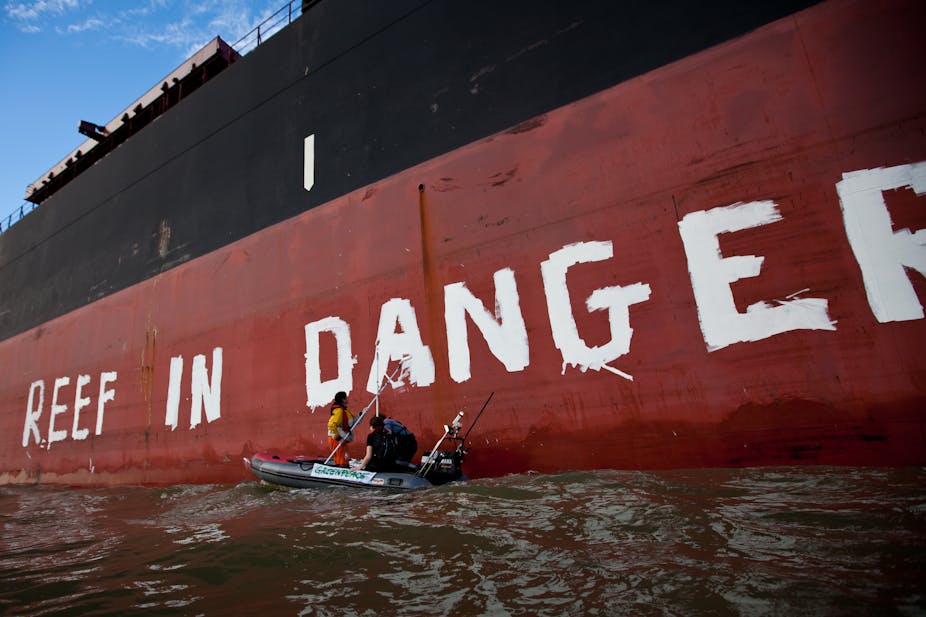Today’s announcement of a network of marine parks for Australia is a big step forward in marine conservation. However, major threats to one iconic marine area, the Great Barrier Reef, are land-based - mining, coastal development, and agricultural run-off. The marine park network will do nothing to diminish these threats.
UNESCO will soon release a detailed assessment of the Great Barrier Reef, which they warn could be downgraded to a World Heritage Site in Danger in the next year. If the in-Danger listing happens, it would be deeply embarrassing to the Queensland and Commonwealth governments, and the worldwide publicity would be an enormous blow to the Australian tourism industry. The comprehensive report expands on a summary released earlier this month, which has triggered a political storm between the Queensland State and Commonwealth governments.
The Great Barrier Reef is slowly declining, an inconvenient truth that is often ignored or denied. In the past 50 years, it has lost half of its coral cover. Many coastal reefs and seagrass meadows have been smothered by runoff of sediments from land, and the numbers of turtles, sharks and dugongs today are a small fraction of a few decades ago. Coral bleaching due to global warming has occurred twice throughout most of the length of the Barrier Reef, in 1998 and 2002.
Modern management of the Reef began in earnest with the establishment of the Great Barrier Reef Marine Park Authority in 1976. In 1981, the Great Barrier Reef was added by UNESCO to the World Heritage List. Yet in 2009, the Commonwealth’s Great Barrier Reef Outlook Report concluded that climate change, the continued decline in water quality from catchment runoff, loss of coastal habitats from coastal development and overfishing were the key pressures reducing the resilience of the Great Barrier Reef. It concluded that “the overall outlook for the Great Barrier Reef is poor and catastrophic damage to the ecosystem may not be averted”.
Marine reserves rebuild depleted stocks of fisheries, but they do not address the impacts of coastal developments and pollution. While today’s announcement of an expanded system of marine parks in Australia is a big step forward, it won’t change how we affect the marine environment from land. The number of major coastal development projects along the Great Barrier Reef has grown hugely in the past decade, and the new Queensland government has promised to reduce “green tape” in the future to speed up planning approvals.
In response, the UNESCO report has formally requested that the Australian Commonwealth prohibits the construction of new ports along the Queensland coast, and that all future coastal developments must not affect the Great Barrier Reef World Heritage Area. Most of these are port developments linked to the explosive growth in export of coal and liquefied natural gas.
Ironically, the State of Queensland is home to the world’s largest coral reef system, but is also has 200 years of coal reserves. But Queensland’s coal and gas industry has a much more limited life-span, because rising levels of CO₂ in the atmosphere will inevitably trigger global action to curb the use of carbon-based fuels, far beyond today’s tentative steps to introduce carbon taxes and market-based instruments.
As far as I know, no Labor or Coalition MP has acknowledged this reality. The rush to get as much fossil fuel out of the ground as quickly as possible, before the transition to alternative sources of energy occurs, has pushed environmental concerns far into the background. The Commonwealth has been complicit in the damage coal mining is causing to the inner Great Barrier Reef World Heritage Area by allowing an unprecedented level of dredging and dumping within the boundaries of the World Heritage Area.
The Queensland Premier, Campbell Newman, responded to the draft UNESCO report, released earlier, by saying that “we are in the coal business. If you want decent hospitals, schools and police on the beat we all need to understand that”. Really? Queensland is also in the tourism business, big time.
If we look after the Reef, tourism will persist as a vibrant industry long after burning coal has followed the dinosaurs into oblivion. According to Access Economics, the Great Barrier Reef contributes over $5 billion to the Australian economy each year, and it supports more than 50,000 jobs, overwhelmingly in tourism. The short-term benefits to Queenslanders of coal and gas jobs are tempered by the long-term negative costs of a polluted atmosphere, global warming, and the diminished heritage values of the Great Barrier Reef, as highlighted by the blunt UNESCO report.
The establishment of the Great Barrier Reef Marine Park by the Commonwealth in 1976, then the world’s largest marine protected area, was a visionary step. It created an agency that had jurisdiction and responsibility for the whole ecosystem (GBRMPA - the Great Barrier Reef Marine Park Authority). The State of Queensland opposed the Park, took the Commonwealth to the High Court, and lost. But GBRMPA has almost no capacity to influence two major drivers of change that are increasingly affecting the Great Barrier Reef – activities on land and in Queensland coastal waters, and climate change. It’s time to rethink how the Great Barrier Reef should be governed for the future. A good outcome will depend on improved State-Commonwealth management of coal ports, and waking up to the reality of climate change.

